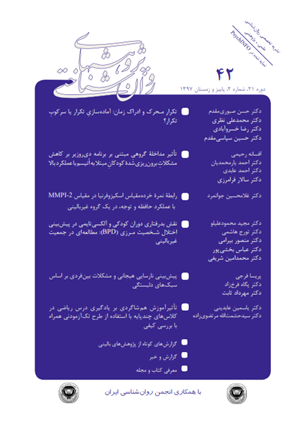"نقش بدرفتاری دوران کودکی و آلکسی تایمی در پیش¬بینی اختلال شخصیت مرزی (BPD): مطالعه ای در جمعیت غیر بالینی "
محورهای موضوعی :
تورج هاشمی
1
,
محمد امین شریفی
2
,
عباس بخشی پور
3
,
مجید محمود علیلو
4
,
منصور بیرامی
5
![]()
1 - دانشگاه تبریز
2 -
3 - دانشگاه تبریز
4 - دانشگاه تبریز
5 - دانشگاه تبریز
کلید واژه: اختلال شخصیت مرزی بدرفتاری دوران کودکی آلکسی¬, تایمی,
چکیده مقاله :
هدف از پژوهش حاضر پیش بینی نارسایی هیجانی و مشکلات بین فردی بر اساس سبک های دلبستگی در دانش آموزان است. جامعه آماری شامل 200 دانش آموز دختر مقطع پیش دانشگاهی در سال تحصیلی 95ـ94 در منطقه 2 تهران بود که به روش نمونه گیری خوشه ای چند مرحلهای انتخاب شدند. برای گردآوری داده ها از سه پرسشنامه سبک دلبستگي كولينز و ريد (ASQ)، پرسشنامه نارسایی هیجانی تورنتو (TAS)، و پرسشنامه مشکلات بین فردی (IIP) استفاده شد. نتایج تحلیل داده ها با استفاده از آزمون همبستگی پیرسون و رگرسیون خطی گام به گام نشان دادند که بین سبک های دلبستگی با نارسایی هیجانی و مشکلات بین فردی رابطة معنا دار وجود دارد (01/0>P). همچنین، مؤلفه های دلبستگی قادرند نارسایی هیجانی (حدود 22 درصد) و مشکلات بین فردی را (حدود 27 درصد) در دانش آموزان پیش بینی کنند.
Borderline personality disorder (BPD) is a multidimensional and heterogeneous disorder. Research has shown substantially in the last three decades that child abuse is a pathogenic factor for borderline personality disorder. The main purpose of this study was to predict the borderline personality disorder on the basis of childhood maltreatment and alexithymia, in nonclinical young adults. In this regard, 413 participants were selected using multistage sampling among all students studying in Tehran University. The Borderline Personality Scale (BPS), Child Abuse Self Report Scale (CASRS), and Toronto Alexi-thymia Scale (TAS-20) were used to measure variables. The raw data collected, was analyzed by structural equation modeling. The findings were similar to results of previous studies. The results indicate that theoretical model has a good fitness and childhood traumatic experiences (specially emotional abuse) and alexithymia are good predictors for borderline personality disorder. In addition, results revealed that alexithymia mediated rela-tionship between maltreatment and BPD symptoms
